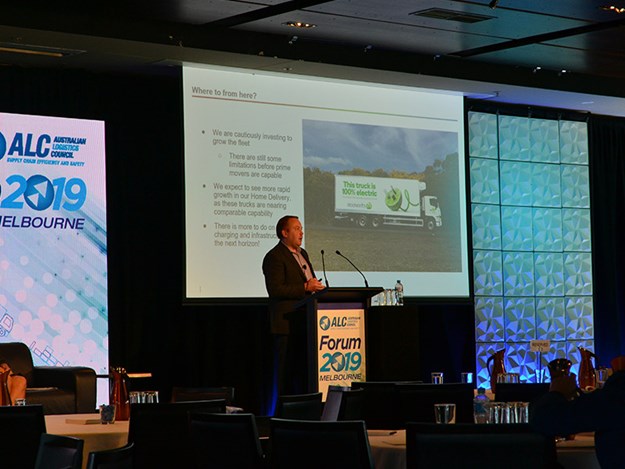Lack of industry push due to 'lack of product quality, availability, infrastructure and government support'
 |
|
Woolworths head of transport development Ben Newton
|
While the interest is there for commercial electric heavy vehicles, and the future is heading in that direction, the short-term reality is that the technology isn’t developed enough yet to suit Australian conditions, and a lack of incentives also makes it unviable from a business perspective.
That’s the general consensus from many of Australia’s largest retailers and transport companies, who spoke at the Australian Logistics Council’s (ALC’s) Forum 2019 recently.
It’s a sentiment echoed by Ikea, which became the latest company in Australia to push the use of electric vehicles, engaging with fleet transport provider ANC to develop a Hino/SEA Electric delivery truck.
In an interview with the Financial Review, Ikea Australia country manager Jan Gardberg called on the government to be “much more active” in supporting electric vehicles so Ikea could deliver all of its home furnishings, soon to include solar panels, in electric trucks by 2025.
“Ikea would ideally like all goods in Australia to be delivered on electric trucks today but there are not enough electric vehicles available,” was one of the main takeaways of the interview.
The following insights emanated from ALC’s 2019 forum:
DHL
DHL Express head of sustainability Olivera Goodwin says, in Australia, DHL’s EV range is limited to two electric Renault Kangoos servicing its internal mail rather than its core “delivery and pick-up service”, with three more being ordered recently.
It has trialled the SEA Electric EV4, “which is the closest we’ve come to an electric vehicle that meets our requirement”, and is also looking at electric bikes.
However, having spoken to other transport companies, Olivera notes there is “interest” in the technology but the same challenges apply: “lack of availability, product quality, infrastructure and government support in terms of incentives”.
Australia Post
General manager of road and air networks James Dixon says Australia Post proposes to spend $60 million on electric vehicles in the next three years. It has had a trial with four Renault Kangoos and delivery trikes notably.
However, following a “year of record sales for traditional heavy vehicle models, there is no push from industry for commercial heavy vehicles”, he notes.
He quotes a statistic that there are around 15 petrol stations for every plug-in charging station currently. There is, rather, more interest in different battery types and hydrogen technology forecast for the three to five years.
Dixon says Australia Post has spoken to the likes of Volvo, Ford and Tesla, but the returns on the electricity, or an appropriate model, are just not available yet.
For example, Tesla quotes a 38-tonne gross vehicle mass (GVM) vehicle requiring a 7.5-tonne battery with a range of 300km, which isn’t suitable for Australia’s “geographical complexity”.
“There just isn’t a push from industry,” he notes. “Nobody is pushing the boundaries yet.”
Woolworths
Woolworths head of transport development Ben Newton claims that Woolworths has Australia’s largest electric vehicles – with an 11-tonne payload, 14-pallet capacity, full electric drive, a 212kW battery and 200km range.
At the moment, the technology is more applicable to home deliveries, Newton says.
Industry expects EVs to come, but is waiting to see how it plays out on the regulatory side and operating perspective.
For example, operational restrictions may ease as larger vehicles quieter at night. Getting charging into the operating mix is critical, too, such as a top-up charge while a driver sits in store.
However, OEMs don’t forecast having an EV in Australia until 2021, Newton notes.
Qube
Qube Holdings general manager of health, safety environment Belinda Flynn details Qube’s developments at its Moorebank Logistics Park.
In 2019, it engaged with Kalmar to develop an integrated shipping container handling solution, which includes automatic stacking cranes, gantries, and Kalmar FastCharge auto shuttles.
Qube sees the next generation of mobile port machinery turning towards hybrid solutions, Flynn notes.

